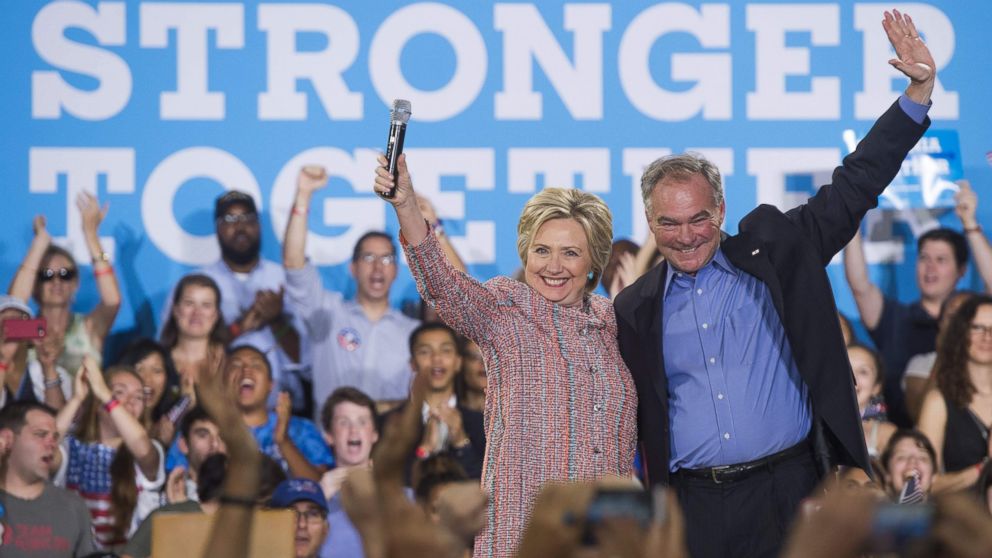Democratic National Convention 2016: Everything You Need to Know
— -- The Republican National Convention wrapped up this week, and now it is the Democrats’ turn in the spotlight.
Democrats from all over the country will gather at Philadelphia's Wells Fargo Center, the arena home of the 76ers and the Flyers, from Monday, July 25, through Thursday for the Democratic National Convention, which will formally nominate Hillary Clinton as the party’s presidential nominee and Virginia Sen. Tim Kaine as her running mate.
Here is everything you need to know about the convention:
Why Philly?
Former Philadelphia Mayor Michael Nutter and former Pennsylvania Gov. Ed Rendell began vying back in 2014 for the chance to host the DNC.
The City of Brotherly Love was officially chosen as the 2016 DNC host city last February, beating out Brooklyn, New York; Columbus, Ohio; and Phoenix, Arizona among others.
Democratic National Committee Chairwoman Debbie Wasserman Schultz confirmed the selection of Philadelphia on Facebook when she pulled a cheesesteak out of a refrigerator in a video.
While it’s not the first time Philadelphia will host a presidential convention, it has been over a decade since the city’s last gig. In 2000, Philadelphia hosted the Republican National Convention, at which then-Texas Gov. George W. Bush became the party's nominee.
Schedule Sneak Peek
The convention is shaping up to be a star-studded event featuring big names in politics alongside Hollywood celebrities.
According to a press release from the convention’s committee, the first night of the convention kicks off with First Lady Michelle Obama and Sen. Bernie Sanders, who was Clinton’s fiercest primary rival, as the headline speakers.
Tuesday night will be the roll call vote that will officially nominate Clinton.
On Wednesday, President Obama and Vice President Joe Biden will deliver remarks. This is also traditionally the night we hear from the vice presidential nominee. Clinton announced Kaine as her running mate on Friday.
Chelsea Clinton will help her mother wrap up the convention on Thursday, and Hillary Clinton is expected to speak about her vision for the country that night.
Throughout the convention, actors and singers who are Hillary supporters will grace the stage, including Katy Perry, Eva Longoria, Alicia Keys, Demi Lovato, Tony Goldwyn, and Lena Dunham.
Other big name political figures who will take the stage throughout the week include: Sen. Elizabeth Warren, Sen. Cory Booker, Sen. Al Franken, Gov. Andrew Cuomo, former Maryland Gov. Martin O’Malley and New York City Mayor Bill de Blasio.
Backing for Bernie
Sanders’ presidential campaign may have come to an end, but the movement he started continues. The City of Brotherly Love will “feel the Bern,” as supporters hold a week of rallies to show their support for the Vermont senator.
“We want a YUGE demonstration/march at the convention in Philly as well as YUGE solidarity marches across the country to send a clear message to the establishment,” the Facebook page created for, “March for Bernie at DNC,” reads.
Philadelphia approved four pro-Sanders rallies during convention week
Superdelegate Fight Spills Over Into Philly
In the later stages of Sanders’ campaign for the Democratic nomination, many of his supporters expressed anger about the party's system of using superdelegates who exercise a lot of power in selecting a nominee.
Superdelegates -- unbound delegates who typically hold or have held elective office Congress, as a governor or the like -- are free to vote for the candidate of their choice during the formal nominating process.
It is the support of these unpledged delegates that, when combined with bound delegates distributed as a result of caucus and primary vote totals, pushed Clinton over the threshold to clinch the nomination.
Some are seeking to eliminate the influence of superdelegates during future primaries and conventions. The DNC Rules Committee is meeting Saturday to vote on the suspension of the superdelegate system.
“It is time for the DNC and its Rules Committee to ensure that the voices of voters -- not party insiders -- will always be the deciding factor in our nominating process,” said Aaron Regunberg, a Rhode Island state representative and DNC Rules Committee member.




